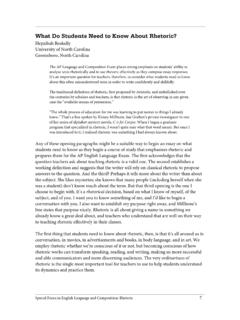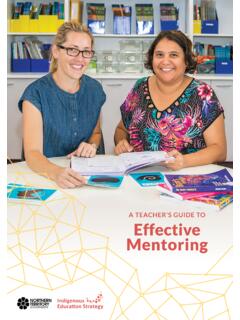Transcription of What makes great pedagogy? Nine claims from research
1 Inspiring leaders to improve children s livesWhat makes great pedagogy ? nine claims from researchSchools and academiesResourceResearch and development network national themes: theme oneAutumn 2012 Chris Husbands and Jo Pearce 2 National College for School Leadership There is a strong consensus that high performance in education systems is dependent on the quality of teaching. Barber put it simply: the quality of an education system cannot exceed the quality of its teachers (Barber & Mourshed, 2007:13) and his report for McKinsey concluded that the best school systems are those that have the best teachers (ibid:7).Recent UK research concluded that having a very effective, rather than an average teacher raises each pupil s attainment by a third of [an examination] grade (Machin & Murphy, 2011:5). In a review of the research on teacher quality, Machin argues that:Bringing the lowest-performing 5-10 per cent of teachers in the UK up to the average would greatly boost attainment and lead to a sharp improvement in the UK s international ranking.
2 All other things equal, in 5 years the UK s rank amongst OECD countries would improve from 21st in reading to as high as 7th, and from 22nd in maths to as high as ; over 10 years (the period a child is in the UK school system before the PISA examinations) the UK would improve its position to as high as 3rd in reading, and as high as 5th in :5 Whelan provides a useful summary:School systems need to ensure that their curricula are relevant and contain enough flexibility to accommodate different learners and different social and economic needs. They need to ensure that school buildings are in good All these things are important and ultimately impact academic performance. However, none is nearly as important as the quality of , 2009:35 PISA data suggests that whilst variance in performance within schools is widespread and particularly in countries that select pupils relatively early in the secondary phase in almost all systems, in-school variation, or variance between teachers, is much greater (McGaw, 2008).
3 Summarising the evidence, Schwartz concludes that the most important school-related factor in student is teaching (Schwartz, 2009:online).However, there is much less attention in the overall literature on what constitutes effective teaching, or, put differently, on the behaviours and actions of good teachers: what it is that good teachers do to promote good learning. At its worst, this produces a circular argument: good teachers are those who produce good outcomes, so that those pupils with good outcomes must have been taught by good teachers. In this paper, the research literature is used to advance nine strong claims about the characteristics of highly successful 1 In this review we refer to pedagogies rather than pedagogy . We do this in order to capture the variety of successful pedagogic practices which differ across the age range and between pedagogy : nine claims from research3 National College for School Leadership 1.
4 Effective pedagogies give serious consideration to pupil Effective pedagogies depend on behaviour ( what teachers do), knowledge and understanding ( what teachers know) and beliefs (why teachers act as they do).3. Effective pedagogies involve clear thinking about longer term learning outcomes as well as short-term Effective pedagogies build on pupils prior learning and Effective pedagogies involve scaffolding pupil Effective pedagogies involve a range of techniques, including whole-class and structured group work, guided learning and individual Effective pedagogies focus on developing higher order thinking and metacognition, and make good use of dialogue and questioning in order to do Effective pedagogies embed assessment for Effective pedagogies are inclusive and take the diverse needs of a range of learners, as well as matters of student equity, into account. The research underpinning the claims is outlined below. 1. Effective pedagogies give serious consideration to pupil voiceThere is robust evidence that giving serious consideration to pupil voice can generate highly effective pedagogy .
5 Listening to pupil voice involves more than hearing what pupils have to say as part of the process of learning and teaching, and increasing attention has been given in recent years to the issues involved in, and the potential benefits that flow from, consulting pupils about this process. According to Niemi, Heikkinen and Kannas, involving in educational decision-making, and listening seriously to their stories of experiences as learners [are] essential first steps in developing education (Niemi, Heikkinen & Kannas, 2012:139). Rudduck explains: Consultation is about talking with pupils about things that matter in school. It may involve: conversations about teaching and learning; seeking advice from pupils about new initiatives; inviting comment on ways of solving problems that are affecting the teacher s right to teach and the pupil s right to learn; inviting evaluative comment on recent developments in school or classroom policy and , 2005:online Robinson and Taylor point to a wide ranging literature citing numerous examples of how student voice work has led to changes in schools , noting that in some cases this has been as a result of teachers increasing their understanding of students experiences and as a result, choosing to change their practice (Robinson & Taylor, 2007:14).
6 Exploring foreign language learning, Payne found that pupils made a valuable contribution by acting as a conduit to their respective language communities and provided insight in linguistic terms into the complex and nuanced issues inherent in such communities (Payne, 2007:89). Ferguson, Hanreddy and Draxton urge teachers to involve pupils in meaningful decision-making and dialogue (2011:55; emphasis added). Aside from the questionable ethics of superficial pupil consultation, there are practical and pragmatic reasons for serious engagement with pupil voice. Evidence from the teaching and learning research programme (TLRP) on consulting pupils (TLRP, 2003:online) suggests that pupils respond with insight and intelligence when consulted meaningfully. Morgan reports on the valuable contributions that pupils have made to pedagogy in one school where they were directly involved in teacher observations. It is clearly not only the pupils who benefit from this particular expression of their voice: 4 National College for School Leadership I continue to be astonished by the contributions students make to improving the practice of trainee teachers.
7 I am continually impressed by the feedback they provide, particularly in face-to-face conversations, and by the professionalism and sensitivity they display, by their incisiveness and ability to prioritise, by their skill at encouraging trainees and making well-judged , 2008:20 Gilljam, Esaiasson and Lindholm argue that schools will likely function better if pupils are motivated to accept binding decisions, and/or if they perceive that decisions are fairly made (Gilljam, Esaiasson and Lindholm, 2012:75). According to Sellman, involving pupils in decision-making directly impacts upon learning and teaching. He points to the work of Fielding and Bragg, and says that according to them: ..the benefits of such forms of involvement can include: Improved academic, communication and civic skills amongst students , as well as an increased sense of agency, motivation and engagement with schools affairs; Insights for teachers, which can lead to improved practice and relationships with students for teachers; Important feedback for schools, which can help improve teaching and learning.
8 Sellman, 2009:33 4 Robinson and Taylor point out that the word voice .. implies that a pupil group has only one voice and, further, that such a monolingual assumption is illusory (Robinson & Taylor, 2007:7). There are a number of pupil voices and the serious consideration of pupil voice does not allow for the selection of, or overgeneralisation from, the most palatable (easily accommodated?) of them (ibid). Ferguson, Hanreddy and Draxton point to Cook-Sather s warning that doing so may cause minority perspectives to become invisible (Ferguson, Hanreddy & Draxton, 2011:55) and that he (Cook-Sather) advises that some minorities are silent because we do not know how to hear them (Cook-Sather, 2007:394). In their study, Ferguson, Hanreddy and Draxton designed an alternative interview for students who did not use verbal language or symbolic communication. Other voices we are less able to hear can include those of some pupils who speak English as an additional language (EAL).
9 Although there is much to be gained from meaningful engagement with pupil voice, it should not be assumed that all teachers have found it easy. Ferguson, Hanreddy and Draxton found that despite the substantial body of evidence supporting student student perceptions regarding their learning environment are still seldom considered a valid source of data by school leaders or even teachers (Ferguson, Hanreddy & Draxton, 2011:61). Robinson and Taylor argue for a need to acknowledge the range of institutional and professional which prevent dialogue, participation and transformation (2007:15). Ferguson, Hanreddy and Draxton suggest that teachers need not find the prospect of taking seriously pupil voice threatening, though it is not always comfortable. They report on the responses of teachers to pupil feedback about classroom environment and practice. In general, the teachers were of the view that the pupils had engaged seriously with the task.
10 Sellman reports: when given such opportunities students often surprise adults by repaying trust with fair and realistic feedback (Sellman, 2009:34). Robinson and Taylor argue for a need to acknowledge the range of institutional and professional which prevent dialogue, participation and transformation (Robinson & Taylor, 2007:15).Ferguson, Hanreddy and Draxton found that most teachers were keen to take action as a result of pupil feedback, especially where the feedback suggested that a student s emotional wellbeing was at risk, but also found a minority of teachers unwilling to accept responsibility for learning difficulties faced by pupils, plac[ing] the locus of control entirely on the student (2011:65). This points to the necessity of good pupil teacher relationships, as well as a willingness on the part of both to engage with the process, if pupil voice is to be taken seriously. At the same time the right of pupils not to participate should be respected (Payne, 2007).













